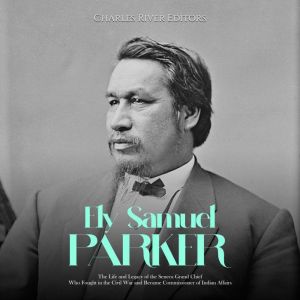
List: $6.95
| Sale: $4.87
Club: $3.47
Ely Samuel Parker: The Life and Legacy of the Seneca Grand Chief Who Fought in the Civil War and Became Commissioner of Indian Affairs
Author: Charles River Editors
Narrator: KC Wayman
Unabridged: 1 hr 40 min
Format: Digital Audiobook Download
Publisher: Charles River Editors
Published: 08/20/2022
Synopsis
Despite their own cultural differences, the nations that comprised the Iroquois Confederacy established their political dominance across much of America’s East Coast and Midwest through conquest, and it is that aspect which has perhaps best endured among Americans in terms of the Iroquois’ legacy. European settlers who came into contact with the Mohawks in the Northeast certainly learned to respect their combat skills, to the point that there were literally bounties on the Mohawks’ heads, with scalps fetching money for colonists who succeeded in slaying them and carrying away the “battle prize”. One of the best known of the six nations is the Seneca, and arguably the most famous Seneca chief was Ely Samuel Parker. Over the course of his life, he was a Seneca chief, a civil engineer, a close friend and adjutant to General Ulysses S. Grant, an advocate for the Indian peoples, and the first Native American Commissioner of the Department of Indian Affairs. His marriage to a much younger socialite scandalized Washington, and he made a fortune on Wall Street and lost it all. He ended his life in genteel poverty, working for nearly 20 years in an obscure position for the New York City Police Department. Parker was a largely self-taught engineer, who worked on various canal projects, and was hired by the Department of the Treasury to supervise the construction of several buildings in Galena, Illinois, where he met a shy salesclerk named Ulysses S. Grant. At the age of 18, he dined with President Polk, later talked with President Lincoln, and had the commanding general of the U.S. Army as the best man at his wedding. He was the principal source for the first serious ethnological work by one of the first American ethnologists, who dedicated the book to Parker. He was a plaintiff before the U.S. Supreme Court when he was in his teens and was so important in the Seneca’s struggle to retain their Tonawanda reservation that he was made grand sachem.